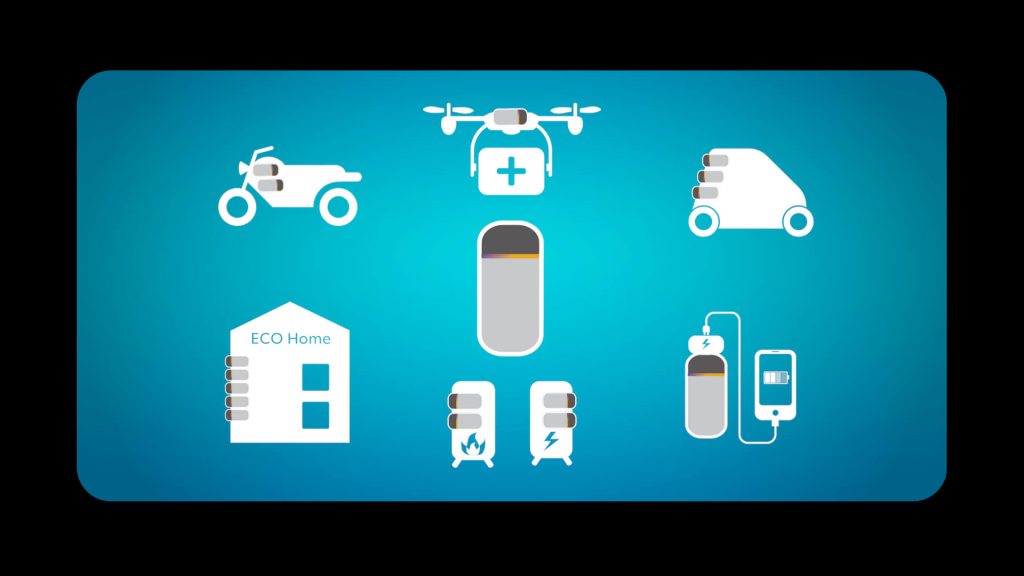TOYOTA MOTOR CORPORATION (“Toyota”) and its subsidiary, Woven Planet Holdings, Inc. (“Woven Planet”), have developed a working prototype of its portable hydrogen cartridge. This cartridge design will facilitate the everyday transport and supply of hydrogen energy to power a broad range of daily life applications in and outside of the home. Toyota and Woven Planet will conduct Proof of Concept (“PoC”) trials in various places, including Woven City, a human-centered smart city of the future currently being constructed in Susono City, Shizuoka Prefecture.
Toyota and Woven Planet are studying a number of viable pathways to carbon neutrality and consider hydrogen to be a promising solution. Hydrogen has significant advantages. Zero Carbon Dioxide(CO2)is emitted when hydrogen is used.
Furthermore, when hydrogen is produced using renewable energy sources such as wind, solar, geothermal, and biomass, CO2 emissions are minimized during the production process as well. Hydrogen can be used to generate electricity in fuel cell systems and can also be used as a combustion fuel.

Together with ENEOS Corporation, Toyota and Woven Planet are working to build a comprehensive hydrogen-based supply chain aimed at expediting and simplifying production, transport, and daily usage. These trials will focus on meeting the energy needs of Woven City residents and those living in its surrounding communities.
Benefits of Using Hydrogen Cartridges
- Portable, affordable, and convenient energy that makes it possible to bring hydrogen to where people live, work, and play without the use of pipes
- Prototype dimensions: 400mm (16″) in length x 180mm (7″) in diameter
- Target weight: 5 kg (11lbs)
- Swappable for easy replacement and quick recharging
- Volume flexibility allows for a broad variety of daily use applications*2
- Small-scale infrastructure can meet energy needs in remote and non-electrified areas and be swiftly dispatched in the case of a disaster
Next Steps for the Hydrogen Cartridge
Today most hydrogen is generated from fossil fuels and used for industrial purposes such as fertilizer production and petroleum refining. To use hydrogen as an energy source in our homes and daily life, the technology must meet different safety standards and be adjusted to new environments. In the future, we expect hydrogen will be generated with very low carbon emissions and used in a wider variety of applications. The Japanese government is working on a range of studies to promote the safe early adoption of hydrogen and Toyota and its business partners are excited to offer cooperation and support.
Our goal is to help hydrogen become commonplace by making this clean form of energy safe, convenient, and affordable. By establishing the underlying supply chain, we hope to facilitate the flow of a larger volume of hydrogen and fuel more applications. Woven City will explore and test an array of energy applications using hydrogen cartridges including mobility, household applications, and many future possibilities we have yet to imagine.
Together with inventors and those living within and around Woven City, we will continue to advance mobility over time by constantly developing more practical applications for hydrogen cartridges. In future Woven City demonstrations, we will continue to improve the hydrogen cartridge itself, making it increasingly easy to use and improving the energy density.
The ultimate goal of this project is to realize a carbon-neutral society where everyone can access clean energy, first in Japan and then throughout the world. Toyota and Woven Planet aim to develop best practices for incorporating clean hydrogen energy into daily life by conducting human-centered demonstrations in and around Woven City. These real-life experiences will help us learn how to best transform hydrogen into a familiar, well-used, and well-loved form of energy.
The portable hydrogen cartridge prototype will be showcased at Super Taikyu Series 2022 Round 2 at Fuji SpeedWay from June 3 to 5, 2022*3. Our showcase is geared toward teaching people about how hydrogen energy works and helping them imagine the countless ways hydrogen can become a useful part of their daily lives.
*1 Specifications and design are subject to change. The target weight of a full tank (5kg) excludes a valve and protector. Multiple types of receptacles will be considered in the future based on further application research over time.
*2 When electricity is generated by a typical FC system, one hydrogen cartridge is assumed to generate enough electricity to operate a typical household microwave for approximately 3-4 hours (based on the assumption of using a future iteration, high-pressure hydrogen tank with an electricity output of approximately 3.3 kWh/unit).
*3 Our showcase will be on June 4 and June 5 only.
